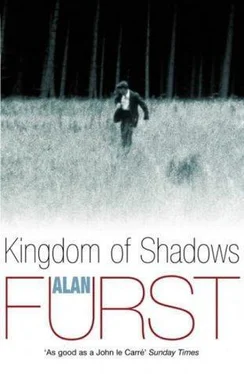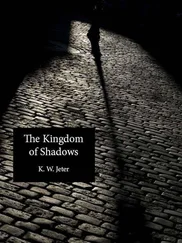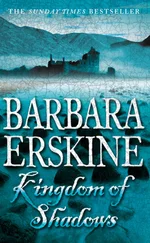Alan Furst - Kingdom of Shadows
Здесь есть возможность читать онлайн «Alan Furst - Kingdom of Shadows» весь текст электронной книги совершенно бесплатно (целиком полную версию без сокращений). В некоторых случаях можно слушать аудио, скачать через торрент в формате fb2 и присутствует краткое содержание. Жанр: Шпионский детектив, на английском языке. Описание произведения, (предисловие) а так же отзывы посетителей доступны на портале библиотеки ЛибКат.
- Название:Kingdom of Shadows
- Автор:
- Жанр:
- Год:неизвестен
- ISBN:нет данных
- Рейтинг книги:5 / 5. Голосов: 1
-
Избранное:Добавить в избранное
- Отзывы:
-
Ваша оценка:
- 100
- 1
- 2
- 3
- 4
- 5
Kingdom of Shadows: краткое содержание, описание и аннотация
Предлагаем к чтению аннотацию, описание, краткое содержание или предисловие (зависит от того, что написал сам автор книги «Kingdom of Shadows»). Если вы не нашли необходимую информацию о книге — напишите в комментариях, мы постараемся отыскать её.
Kingdom of Shadows — читать онлайн бесплатно полную книгу (весь текст) целиком
Ниже представлен текст книги, разбитый по страницам. Система сохранения места последней прочитанной страницы, позволяет с удобством читать онлайн бесплатно книгу «Kingdom of Shadows», без необходимости каждый раз заново искать на чём Вы остановились. Поставьте закладку, и сможете в любой момент перейти на страницу, на которой закончили чтение.
Интервал:
Закладка:
They came for him at dawn.
The door opened and two guards took him under the arms, ran him down the hall, and hauled him up the staircase. It was barely daylight, but even the soft gloom hurt his eyes. They gave him back his shoes, then shackled him at the wrists and ankles, and he shuffled out the front door to a waiting truck. There were two other prisoners in there, one a Gypsy, the other perhaps a Russian, tall, with sheared white hair and blue tears tattooed at the corners of his eyes.
Only the women who swept the street saw him leave. They paused for a bare moment, their brooms, made of bundles of reeds, resting on the ground. Poor boys. God help you. Morath never forgot it.
The truck bounced on the cobbles. The Gypsy caught Morath’s eye and sniffed the air-they’d driven past a bakery. It wasn’t a long ride, maybe fifteen minutes. Then they were at the railroad station where trains, Morath understood perfectly, left for towns like Iasi, or Sinaia.
Three men in chains and six policemen. That was something worth looking at when your train stopped in Bistrita. Passengers lowered the tops of their windows to see the show. A commercial traveler, from the look of him, peeling an orange and throwing the rind on the station platform. A woman in a pillbox hat, the dark veil hiding her eyes, white hands resting atop the window. Other faces, pale in the early light. A man made a joke, his friend laughed. A child, who watched Morath with wide eyes, knowing she was allowed to stare. A man in an overcoat with a velvet collar, stern, elegant, who nodded to Morath as though he knew him.
Then, chaos. Who were they? For slow-motion moments the question raced through Morath’s mind. They came from nowhere. Moving too fast to count, shouting in-was it Russian? Polish? The policeman at Morath’s side was hit. Morath heard the impact, then a yelp, then he staggered off somewhere, groping at his holster. A man in a soft hat stepped from a cloud of steam vented by the locomotive. A cool, frosty morning, he’d wrapped a muffler around his throat, tucked the ends inside his jacket, and turned up the collar. He studied Morath carefully, for what seemed like a long time, then swung his shotgun a little to one side and fired both barrels. Several passengers gasped, the sound, to Morath, was clear as a bell.
The Russian prisoner knew. Maybe too much, Morath thought later. He stretched out full length on the platform and covered his head with his shackled hands. A lifelong convict, perhaps, who knew that this business was, sadly, not for him, his gods weren’t that powerful. The Gypsy cried out to a man with a handkerchief tied over his face and extended his wrists. Free me! But the man pushed him aside. He almost fell, then tried to run away, taking tiny steps, his ankle chain scraping along the concrete.
In the killing, they almost forgot Morath. He stood alone at the center of it. A detective, at least a man in a suit holding a revolver, ran past, then turned toward Morath, his face anxious, uncertain, the right thing must be done. He hesitated, started to raise his pistol, closed his eyes, bit his lip, and sat down. Now he knew what to do but it was too late. The pistol moved only a few inches, a red gash opened in his forehead, and, very slowly, he collapsed. A few yards away, the train conductor was lying back against a wheel of the coal car. In his eyes, a look Morath knew. He was dying.
Now a black car came driving, very slowly, along the platform. Driven by a young boy, no more than thirteen, hands white on the wheel, face knotted with concentration. He stopped the car while the man in the soft hat dragged another man by the back of his jacket, sliding him up to the rear door of the car. He opened the door and threw him in the backseat. In the middle of it all, screams and shots, Morath could hardly believe that anybody could be that strong.
“Move, dumb ox!” The words in German, the Slavic accent so thick it took Morath a moment to understand. The man gripped his arm like a steel claw. A hook nose, dark face, an unlit cigarette in his lips. “To the truck, yes?” he said. “Yes?”
Morath walked as fast as he could. Behind him, from the train, a cry in Hungarian. A woman, cursing, enraged, screaming, telling them all, brutes, devils, to cease this fouling of the world and go and burn in hell. The man at Morath’s side lost all patience-the rise and fall of distant sirens coming nearer-and dragged Morath toward the truck. The driver reached over and helped him and he sprawled across the passenger seat, then fought his way upright.
The driver was an old man with a beard and a scar that cut across his lips. He pressed the gas pedal, gingerly, the engine raced, then died back. “Very good,” he said.
“Hungarian?”
The man shook his head. “I learn in war.”
He pressed the clutch pedal to the floor as the man in the soft hat ran toward the truck and violently waved his shotgun. Go. Move. “Yes, yes,” the driver said, this time in Russian. He shoved the gear lever forward, and, after a moment, it engaged. He gave Morath an inquisitive look. Morath nodded.
They drove away slowly, into the street behind the station. A police car was idling at the corner, both doors open. Morath could hear the train moving out of the station-the engineer at last come to his senses. A black sedan came flying past and, tires squealing, cut in front of them, then slowed down. A hand came out of the driver’s window and beckoned them forward. The sedan accelerated and, at the next street, turned sharply and sped away.
They were quickly out of Bistrita, the road narrowed, turned to dirt, wound past a few dilapidated farms and villages, then climbed into the Transylvanian forest. At sunset, despite the cold iron on his wrists and ankles, Morath slept. Then woke in darkness. Out the window, a field painted in frost and moonlight. The old man was bent over the wheel, squinting to see the road.
“Where are we?” Morath said.
From the old man, an eloquent shrug. He took a scrap of brown paper from atop the dashboard and handed it to Morath. A crosshatch of lines, drawn in blunt pencil, with notes in Cyrillic script scrawled along the margin. “So, where we are?”
Morath had to laugh.
The old man joined him. Maybe they would find their way, maybe not, so life went.
The truck worked its way up a long hill, the wheels slipping in the frozen ruts, the old man restlessly shifting gears. “Like tractor,” he said. In the distance, Morath saw a dull glow that appeared and disappeared through the trees. This turned out to be, a few minutes later, a low stone building at the junction of two ancient roads, its windows lit by oil lamps. An inn, a wooden sign hung on chains above the door.
The old man smiled in triumph, let the truck roll to a stop in the cobblestone yard, and honked the horn. This produced two barking mastiffs, galloping back and forth in the headlights, and an innkeeper wearing a leather apron, a blazing pitch-pine torch held high in one hand. “You are welcome in this house,” he said, in formal Hungarian.
A deliberate man, round and genial. He took Morath to the stable, set the torch in a bracket, and, with hammer and chisel, broke the shackles and took them off. As he worked, his face grew sorrowful. “So my grandfather,” he explained, repositioning the chain atop an anvil. “And his.”
When he was done he led Morath to the kitchen, sat him in front of the fire, and served him a large glass of beer and a thick slice of fried cornmeal. When Morath had eaten, he was shown to a room off the kitchen, where he fell dead asleep.
When he woke, the truck was gone. The innkeeper gave him an old jacket and a peaked cap, and, later that morning, he sat next to a farmer on a wagon and entered Hungarian territory by crossing a hayfield.
Читать дальшеИнтервал:
Закладка:
Похожие книги на «Kingdom of Shadows»
Представляем Вашему вниманию похожие книги на «Kingdom of Shadows» списком для выбора. Мы отобрали схожую по названию и смыслу литературу в надежде предоставить читателям больше вариантов отыскать новые, интересные, ещё непрочитанные произведения.
Обсуждение, отзывы о книге «Kingdom of Shadows» и просто собственные мнения читателей. Оставьте ваши комментарии, напишите, что Вы думаете о произведении, его смысле или главных героях. Укажите что конкретно понравилось, а что нет, и почему Вы так считаете.












